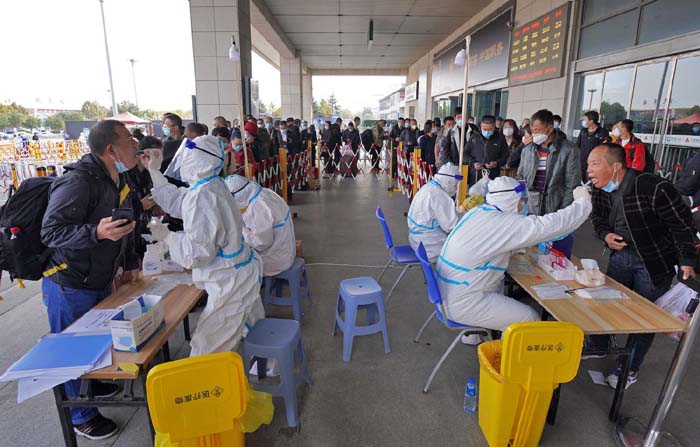
China must insist on zero-COVID policy now and here is why
Hu Xijin
In recent days, there have been increasing voices on the internet that criticize China’s strict implementation of pandemic prevention measures. Western media have collectively targeted China’s zero-COVID-19 policy, slandering the sustainability of China’s anti-pandemic approach.
The complaints on the internet are more complicated. Many of them are about the impact on normal life, and reflect real problems. However, Western opinion really wants to “pull China down” and let China abandon its dynamic zero-COVID policy and become “as bad as them”.
First of all, I would like to say that China’s dynamic zero-COVID policy must not be abandoned. Our pandemic prevention approach should not be abandoned halfway. If we change course to the European and US way of “coexistence with the virus,” China will fall victim to the virus within just a few months, with tens of thousands or even hundreds of thousands of cases a day. The daily death toll could mount to hundreds or even thousands of people. I believe that situation is definitely not something most Chinese are willing to bear.
Every time an outbreak occurs, the implementation of zero-COVID policy will mean economic and social costs. But if we don’t adopt this policy, it will lead to a serious spread of the virus, and the cost will only be higher. Some people have complained about the impact of pandemic prevention on their lives. But if a large number of people are infected and many of them die, the public will have more complaints. Do you remember how strong the public opinion was during the first outbreak in Wuhan around February last year? We must not forget the pain after our scars heal.
Dynamic zero-COVID policy is not something that any country can do if it wants to. If the US and Europe can do it, why didn’t they? The problem is that they really can’t do it. The US population is only a quarter of that of China’s, and its medical technology is very advanced, yet 740,000 people have died. According to Indian official statistics, 450,000 people have died. However, there must be a large number of deaths that have not been counted. Their media’s ridicule of China’s dynamic zero-COVID policy is twisted. To put it bluntly, they are jealous of China’s capability.
Next, I would like to say that while we insist on a dynamic zero-COVID policy, we must keep drawing lessons, improve the humanity side of the process, and minimize losses. Therefore, we must attach great importance to complaints for specific prevention and control measures on the internet. We must carefully examine whether the relevant measures are excessively strict and deviate from the specific situation. In addition, for bridgeheads like Ruili, Yunnan Province, how our society cares for, encourages, and helps them on a larger scale is also worthy of continuous research and reflection.
Almost all parts of China have experienced repeated occurrences of the pandemic. Many prevention and control measures have been proven to be highly effective. In order to shorten the time to reach zero-case, some places have adopted multiple measures at the same time. While this has achieved results, it has caused some people to pay a greater price in a short term. Whether the comprehensive economic and social price for doing so is cost effective or not, I think it still needs to be continuously verified in practice.
It is important to point out that public opinion believes that local officials are now very worried about being held accountable for their “ineffective anti-epidemic” measures. Therefore, some of the additional measures are promoted by such “political reasons.” This is worthy of attention. There is no tangible scale for precise prevention. In order to prevent further spread, sometimes the only way is to do it with excessive measures. However, such “excessive practices” should also be an “expansion” under the guidance of scientific control measures. Officials shall never think about “shirking responsibility”. To be honest, in many cases, it is not difficult for people to distinguish which measures belong to the large-scale blockade that is necessary for prevention and control when the situation is unclear, and which belong to the excessive prevention measures carried out by individual local officials for the sake of “political correctness.”
I want to add that zero-COVID policy won’t stay in China forever, but policy adjustments require support of more breakthroughs in medical science, and such conditions are obviously not yet mature. As far as today’s situation is concerned, my observation is that the vast majority of Chinese people support the dynamic zero-COVID policy. They understand the way the government of the place where a new outbreak occurs quickly takes strict prevention and control measures. Whoever encounters it, whether this is classified a close contact or sub-close contact, or a district is temporarily shut down, and life and work are immediately affected, some people will definitely feel down on their luck. Others will complain, but generally speaking, the way they express their dissatisfaction is restrained. Overall, people are cooperating with the dynamic zero-COVID policy. This policy is generally in line with the interests of the Chinese people. The public is not muddleheaded.
The epidemic will continue for a long time. Our society must maintain unity and coordination against it. When severe measures are taken by various local governments, it is important to take into consideration for the affected people. Opinions from any quarantine area must be listened to, so must all kinds of complaints on the internet. In the past two years, China has set an example of successful fight against the pandemic. This is a result of the joint fight and dedication of the entire Chinese people under the leadership of the Party and government. We will continue to unite.
The writer is editor-in-chief of the Global Times
